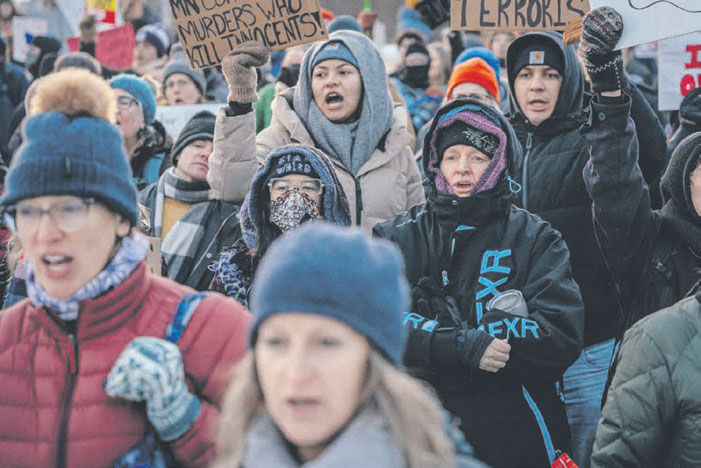Harris concedes the race as Trump is set to transform Washington
- The San Juan Daily Star

- Nov 8, 2024
- 3 min read

By Jonathan Weisman and Katie Rogers
Vice President Kamala Harris, conceding defeat to President-elect Donald Trump on Wednesday, sought to allay her supporters’ deep fears about the future of American democracy, vowing that the fight for pluralism and equality would continue. “It’s going to be OK,” she assured them.
“For everyone who is watching, do not despair,” she told a cheering crowd at her alma mater, Howard University, a historically Black institution in Washington. “This is not a time to throw up our hands. This is a time to roll up our sleeves.”
Trying to sound upbeat in a 12-minute address that ended a failed, 107-day presidential campaign, Harris seemed to tap into the anxieties of much of the nation — albeit not a majority — that the United States was entering dark times, with a president at the helm who has expressed authoritarian ambitions to punish his enemies, exert his authority ruthlessly and be a “dictator,” if only on Day 1.
She called accepting defeat “a fundamental principle of American democracy,” her meaning clear even as she made no mention that her opponent had done no such thing four years earlier. And to her most worried supporters, she offered a proverb: “Only when it is dark enough can you see the stars.”
Trump is the first former president in more than 120 years to win a second term after a reelection defeat. His big gains across the country helped deliver Senate control to his party. Control of the House has not yet been declared, but Republicans may well hold on to their slender majority — now with the undisputed leader of the party in the White House exerting control over the unruly House crew.
The Republican majority in the Senate was secured with the defeats of Democratic incumbents Sherrod Brown of Ohio and Jon Tester of Montana, as well as the capture of the West Virginia seat of the retiring Sen. Joe Manchin.
But the Republican majority will not be the historically large margin that it appeared it could be. Sen. Tammy Baldwin, D-Wis., eked out a victory over her Trump-backed opponent, Eric Hovde. And Rep. Elissa Slotkin, D-Mich., won her race to replace retiring Sen. Debbie Stabenow, keeping the seat in Democratic hands. Swing-state Senate contests in Pennsylvania, Nevada and Arizona remained uncalled Wednesday.
Even so, the former president’s victory left no doubt Republican power was surging. Voters chose Trump as the stronger leader for uncertain times and as one they saw as a proven economic champion. He rode a wave of anxiety over inflation and illegal immigration by promising to bring his strongman-style of politics to the White House. They looked past his 34 felony convictions, his role inspiring an assault on the Capitol, and his indictments on charges of trying to subvert the 2020 election and to hold on to classified documents.
Trump’s victory in one of the most tumultuous campaigns in recent memory — including two failed assassination attempts — makes him, at 78, the oldest man to be elected president.
World leaders congratulated the president-elect, in some cases setting aside long-standing concerns over his proposed taxes on imported goods and his foreign policy views — particularly whether he would roll back U.S. support for Ukraine as it attempted to fight off the Russian invasion.
Prime Minister Benjamin Netanyahu of Israel, whose relationship with President Joe Biden has become strained over the war in the Gaza Strip, said Trump’s win offered a “powerful recommitment to the great alliance between Israel and America.” And Prime Minister Keir Starmer of Britain said he looked forward to working with Trump.
For Harris, who sought to make history not only as the first woman but as the first Black and Asian American woman to be elected president, the hard-fought contest was a 3 1/2-month sprint that began after Biden abandoned his reelection campaign under pressure.
In the end, the headwinds of post-pandemic inflation, soaring housing prices and economic uncertainty were too much for her to overcome, even though the Biden administration’s sprawling economic agenda helped to stimulate the nation’s recovery from recession and make America’s economic growth the envy of the world.
Trump centered his campaign on sealing the U.S.-Mexican border and deporting immigrants without legal status by the millions. He promised to impose sweeping tariffs to strengthen domestic industries. And in the final weeks of the campaign, he made a flurry of expensive financial promises to different sectors of the electorate, promising to abolish taxes on tips, overtime pay and Social Security benefits.
His closing message focused on blaming Harris for all the perceived failures of the unpopular Biden administration, under the slogan “Kamala Broke It. Trump Will Fix It.”






Comments